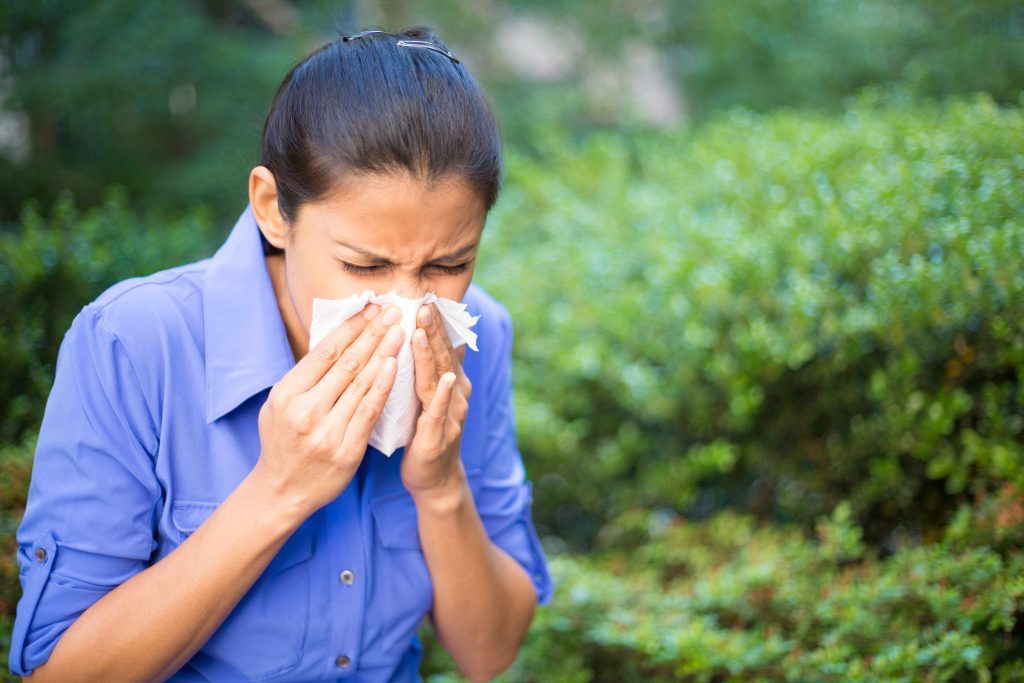-
Mayo Clinic Q and A: Managing nosebleeds

DEAR MAYO CLINIC: My daughter seems to be prone to nosebleeds, and I am unsure why. She is 19 and has allergies. Over the past few months, she has experienced several nosebleeds that lasted a long time. She has had no trauma to her nose. Why does this happen, and how can I help her?
ANSWER: At some point, almost everyone will experience a nosebleed, also known as epistaxis. They are fairly common, especially during dry winter months. Although rarely life-threatening, nosebleeds can cause anxiety and sometimes be difficult to control.
Nosebleeds occur when a small blood vessel in the nasal septum — the partition that divides the two sides of your nose on the inside — ruptures. This can occur when something traumatizes the mucosa of the septum, like a fingernail accidentally scratching the tissue while blowing the nose.
Nosebleeds also can occur when the nasal mucosa is dry and the blood vessels are more prone to tearing. This is why people tend to have more nosebleeds during the winter when the heated indoor air is dry. These are called "anterior bleeds," and they usually present with brisk bleeding out of one nostril. People who live in the South also may experience nosebleeds, especially if they are in a drier climate.
Other causes of nosebleeds can include acute sinusitis; allergies; a deviated septum; or nasal sprays, such as those used to treat allergies, if they are used frequently.
Less commonly, a larger vessel more toward the back of the nasal cavity may be involved. This type of nosebleed is called a "posterior bleed," which tends to be more severe and often requires emergency treatment.
Other less common causes of nosebleeds may lead to recurring or serious bleeding. Some examples include clotting disorders, such as hemophilia; cancerous growths in the nose or sinus; disorders causing multiple abnormalities in the blood vessels; and the use of anticoagulant medications commonly prescribed for patients with heart conditions.
Depending on how often your daughter is experiencing nosebleeds, it may be time to have her evaluated by an ear, nose and throat specialist.
Here's how you can avoid nosebleeds:
- Avoid vigorous nose-blowing, and stuffing tissues or other objects into the nose.
- Discourage children from nose-picking, and keep their fingernails trimmed.
- Use over-the-counter nasal saline sprays and topical nasal moisturizing gels.
- Use a home humidifier to keep moisture in the air during winter months.
- If you smoke, consider quitting. Tobacco smoke dries out the nasal mucosa and increases the risk for nosebleeds.
Fortunately, most nosebleeds are self-limiting and require minimal treatment. By staying calm and following some simple steps, most nosebleeds can be managed without the need of medical assistance.
You should follow these steps if you get a nosebleed:
- Gently blow your nose to clear any blood clots.
- If available, spray an over-the-counter nasal decongestant two to three times into the side of the nose that's bleeding.
- Apply direct pressure to the nose by pinching the nostrils shut for five to 10 minutes. Lean slightly forward to prevent bleeding into the throat. Breathe through your mouth.
- If the bleeding stops, avoid nose-blowing or strenuous activity for the remainder of the day, and begin a daily nasal moisturizing regimen with nasal saline or gel for a period of one to two weeks.
- If the bleeding doesn't stop, repeat the steps as necessary.
- Seek medical attention if the bleeding doesn't stop after 30 minutes, if you have trouble breathing, have suffered severe nasal trauma, or have lost a significant amount of blood and feel weak.
For more serious bleeds or frequent rebleeding, you may need to have a blood vessel cauterized. Cautery is a technique where the blood vessel is burned with an electric current, silver nitrate or a laser. Your health care professional may pack your nose with special gauze or an inflatable latex balloon to put pressure on the blood vessel and stop the bleeding. — Dr. Thomas Lowry, Otolaryngology ― Head and Neck Surgery, Mayo Clinic Health System, Eau Claire, Wisconsin
Related Articles







